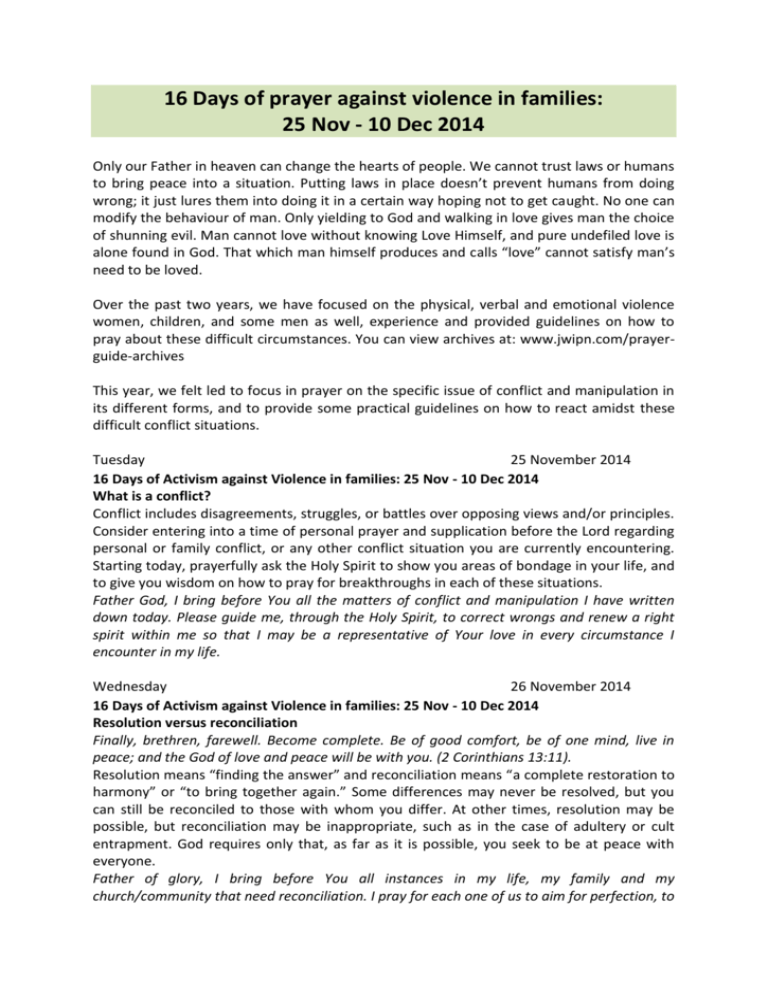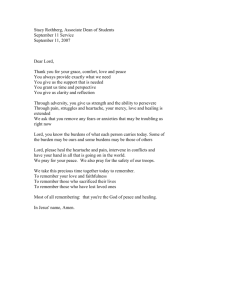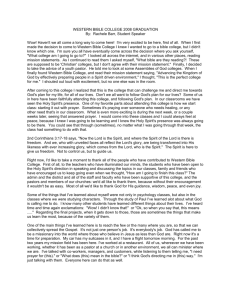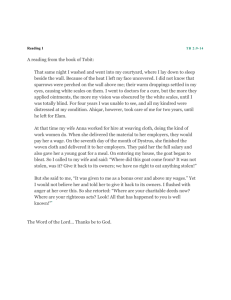16 Days of prayer against violence in families: 25 Nov
advertisement

16 Days of prayer against violence in families: 25 Nov - 10 Dec 2014 Only our Father in heaven can change the hearts of people. We cannot trust laws or humans to bring peace into a situation. Putting laws in place doesn’t prevent humans from doing wrong; it just lures them into doing it in a certain way hoping not to get caught. No one can modify the behaviour of man. Only yielding to God and walking in love gives man the choice of shunning evil. Man cannot love without knowing Love Himself, and pure undefiled love is alone found in God. That which man himself produces and calls “love” cannot satisfy man’s need to be loved. Over the past two years, we have focused on the physical, verbal and emotional violence women, children, and some men as well, experience and provided guidelines on how to pray about these difficult circumstances. You can view archives at: www.jwipn.com/prayerguide-archives This year, we felt led to focus in prayer on the specific issue of conflict and manipulation in its different forms, and to provide some practical guidelines on how to react amidst these difficult conflict situations. Tuesday 25 November 2014 16 Days of Activism against Violence in families: 25 Nov - 10 Dec 2014 What is a conflict? Conflict includes disagreements, struggles, or battles over opposing views and/or principles. Consider entering into a time of personal prayer and supplication before the Lord regarding personal or family conflict, or any other conflict situation you are currently encountering. Starting today, prayerfully ask the Holy Spirit to show you areas of bondage in your life, and to give you wisdom on how to pray for breakthroughs in each of these situations. Father God, I bring before You all the matters of conflict and manipulation I have written down today. Please guide me, through the Holy Spirit, to correct wrongs and renew a right spirit within me so that I may be a representative of Your love in every circumstance I encounter in my life. Wednesday 26 November 2014 16 Days of Activism against Violence in families: 25 Nov - 10 Dec 2014 Resolution versus reconciliation Finally, brethren, farewell. Become complete. Be of good comfort, be of one mind, live in peace; and the God of love and peace will be with you. (2 Corinthians 13:11). Resolution means “finding the answer” and reconciliation means “a complete restoration to harmony” or “to bring together again.” Some differences may never be resolved, but you can still be reconciled to those with whom you differ. At other times, resolution may be possible, but reconciliation may be inappropriate, such as in the case of adultery or cult entrapment. God requires only that, as far as it is possible, you seek to be at peace with everyone. Father of glory, I bring before You all instances in my life, my family and my church/community that need reconciliation. I pray for each one of us to aim for perfection, to be of one mind in Jesus Christ, and to live in peace with one another. Please work reconciliation in our hearts towards one another. Thursday 27 November 2014 16 Days of Activism against Violence in families: 25 Nov - 10 Dec 2014 Forgiveness versus reconciliation Can two walk together, unless they are agreed? (Amos 3:3). Forgiveness focuses on releasing the offense; whereas reconciliation focuses on restoring the relationship. Forgiveness requires no relationship; whereas reconciliation requires nurturing a relationship: A time of coming together, where two people walk together in agreement towards the same goal. Father, help me to discern any offence that still needs to be resolved by forgiveness, regardless of whether the other person forgives me or whether our relationship is restored. Also, help me to have discernment and humility to work on relationships that need to be restored in my life, church or community. Friday 28 November 2014 16 Days of Activism against Violence in families: 25 Nov - 10 Dec 2014 Different types of conflict: Intra- and interpersonal conflict Intrapersonal conflict is a struggle within oneself to decide between two or more choices. (Esther 4:11). Interpersonal conflict is a clash of ideas or interests between two or more people. (Esther 3:5). Take time today to write down the intrapersonal conflicts you struggle with as an individual. Ask the Holy Spirit to reveal to you some interpersonal conflicts as well, between yourself and others, or between family members, or within your church. Father, I bring these matters which I have written down. Many of them seem impossible to resolve, especially after having tried so many times to resolve them. I ask for Your Holy Spirit to work in my life, especially in these areas which I surrender to You now. May Your Kingdom come in each area. I pray this also for the interpersonal conflicts You have shown me. Have Your way in our hearts, Father, change them and renew our minds according to Your will and purpose for each of us. Saturday 29 November 2014 16 Days of Activism against Violence in families: 25 Nov - 10 Dec 2014 Different types of conflict: Intra- and inter-organizational conflict Intra-organizational conflict is a competitive or opposing action within a group (family, department, church, political party, state, nation etc.). (Esther 7:7,-10). Inter-organizational conflict is a battle or opposing action between two or more groups (families, companies, religions, countries etc.). (Esther 3:13). When we find ourselves in a position of asking, “should I or shouldn’t I?” we ought to turn to the Lord for strength, courage, and resolution. The circumstance may be disharmony at home, the workplace, or even a situation of war. Take another moment to write down every instance of intra- and inter-organizational conflict the Lord brings to your mind, especially with regards to your city/town, province and country. Father who is in heaven, I bring before you every matter of conflict I have written down. Please show me how to pray according to Your will and purpose for breakthroughs in every situation. Lead me to Scriptures to pray, proclaim and declare over these situations daily, until breakthrough comes. Teach us the humility of Jesus to resolve matters, especially those hard for us to face as a group. Sunday 30 November 2014 16 Days of Activism against Violence in families: 25 Nov - 10 Dec 2014 God’s heart on conflict resolution (1) God can also use conflict to accomplish His purposes. Father we know that in all things God works for the good of those who love You. May all the conflicts I lay before You accomplish Your purpose. (Romans 8:28). Conflict cannot always be avoided. Jesus, You said that in this world we will have trouble. Help us to find our courage in You, for You have overcome the world. (John 16:33). Conflict is not necessarily bad. Handled well, conflict provides an opportunity for rolemodelling. Esther has been a role-model of how to make an appeal to a higher authority for centuries. Father, as iron sharpens iron, so one man sharpens another. Teach me to trust You and abandon self in each conflict situation, as Esther did. (Proverbs 27:17). Monday 1 December 2014 16 Days of Activism Against Violence in Families: 25 Nov-10 Dec 2014 God’s heart on conflict resolution (2) Conflict requires action towards peace. Father, help me, my family, church and community to make every effort to do what leads to peace and to mutual edification. (Romans 14:19). Conflict requires advance preparation and planning. Holy Spirit, in every matter prepare my mind for action; help me to be self-controlled at all times and to set my hope on the grace that is brought to me at the revelation of Jesus Christ. (1 Peter 1:13). Conflict can be settled through negotiation. Lord, teach me how to settle difficult and seemingly impossible matters through Your leading as Esther did when she negotiated with the king graciously. Soften my heart and mind to receive advice and accept instruction so that I may become wise. (Proverbs 19:20). Tuesday 2 December 2014 16 Days of Activism Against Violence in Families: 25 Nov-10 Des 2014 What common statements are used in conflict? All of us experience conflict. Even Paul and Barnabas, two of God’s premier workers in the early church, had “a sharp disagreement” that resulted in them going their separate ways. (Acts 15:39). In prayer, consider how you handle conflict. Here are seven false accusations we use: “You’ll never change.” “You are always against me.” “You will reject me…it’s only a matter of time!” “You can never be trusted.” “You are a failure.” “You are hopeless.” “It’s your fault if this relationship fails.” Here are seven false expectations of those who avoid conflict: “You shouldn’t create conflict in our relationship.” “You would see it my way if you truly love me.” “You would do it my way if you were loyal to me.” “Never get angry with me, because I can’t handle it.” “Only I should meet your needs.” “Only I should make you happy.” “You need me to be secure in yourself.” Now, humble yourself before the Lord admitting the instances true in your life. Father God, I confess each un-Biblical habit I have written down. Each one is greater than I alone can handle. Holy Spirit, please change my ways as I humble myself before You today and work self-control as a fruit of my life. Wednesday 3 December 2014 16 Days of Activism against Violence in Families: 25 Nov-10 Des 2014 How do attackers behave in conflict situations? We develop our style of handling conflict at an early age. Our conflict style comes from our natural instincts, our personality and our early family dynamics. Many of us are unable to defuse conflict, because we only know the patterns we learnt in our childhood: attack or avoidance. However, neither of these styles appropriates the grace available to us as children of God. Do you see similar notions in your own life from the following notes? Write it down and bring it to the Lord in prayer, confessing as the Holy Spirit leads you, BEFORE you start to pray for others showing similar behaviour. Attackers are outwardly aggressive. There are three types of attackers. (1) Dictator: A person, who judges the actions and motives of others, yet refuses to listen to them with an open mind. The Dictator holds power by using criticism and power plays to diminish others. (Matthew 7:15). (2) Backbiter: Someone who says spiteful things behind another’s back. The Backbiter uses criticism, puts others down, and starts false rumours, whilst pretending to have done nothing wrong and gathering allies unto him/her. (Matthew 12:34). (3) Faultfinder: A person predisposed to finding fault, being critical, petty, and a nag. A faultfinder will register repeated complaints, make negative statements about everything, blame others, draw others into disagreements and delight in misery. (Proverbs 18:7). Do you find trends from your own life in the above? Write down which ones apply to you, and bring them before the Lord in prayer and repentance as the Holy Spirit leads you. Do this before you pray for others in whom you see these behaviours displayed. …looking carefully lest anyone fall short of the grace of God; lest any root of bitterness springing up cause trouble, and by this many become defiled… (Hebrews 12:15). Thursday 4 December 2014 16 Days of Activism Against Violence in Families: 25 Nov-10 Des 2014 How do avoiders behave in conflict situations? Avoiders are inwardly passive. There are three types of avoiders. (1) Retreater: A person who withdraws from situations that are difficult, dangerous, or disagreeable: The Retreater acts ignorant, gives monosyllabic answers, withdraws from others and seeks secrecy, leaving the other person to feel guilty for asking a question. (2) The Obliger: A person bound to someone else, for example, in debt to someone for a favour or service. The obliger avoids making decisions, acts innocent, appears agreeable, recoils from commitment and minimizes differences. (Proverbs 29:25). (3) Twister: A person who perverts the meaning of something. The Twister is devious and uses gimmicks, such as defensiveness, sidestepping the issue, manipulating the truth, blaming others, and avoiding “I” statements. (Proverbs 17:20). As you did yesterday, go before the Lord in prayer and ask the Holy Spirit to show you areas in your life where you are an avoider. Surrender these instances and situations and pray for spiritual breakthrough in these areas. Friday 5 December 2014 16 Days of Activism Against Violence in Families: 25 Nov-10 Des 2014 What is the worst type of conflict? For I know the thoughts that I think toward you, says the LORD, thoughts of peace and not of evil, to give you a future and a hope.. (Jeremiah 29:11). Conflict with other people is one matter, but conflict with God is a much bigger matter. Why is conflict with God worse? Because when God created you, He had a plan for you; but when you don’t yield your will to Him, you miss His plan and purposes for your life. This means you are in conflict with the very One who created you and who loves you. God wants a relationship with you so that He can fulfill the purposes for which you were created. Today, ask the Lord to show you things that He has on His heart for you. Perhaps take a long walk with God. Humbly ask Him for forgiveness in areas where you realize you have resisted His purposes for you, or where you have not faced matters, or have reasoned that He feels the same way as you do about an issue, but now realize you were wrong. Saturday 6 December 2014 16 Days of Activism Against Violence in Families: 25 Nov-10 Des 2014 What is the root cause of conflict? The reason we all experience conflict is because we falsely believe that we need what we want and we must defeat all who oppose us in achieving this goal. Fear-based thinking results in selfish responses: attacking or avoiding people or situations we see as threatening our goal. It is not easy to be honest with ourselves or with God, but today, write down the times when you have been deeply hurt or disappointed by another person or situation. Now, test yourself regarding your beliefs: Are they wrong or right? For example, I am afraid of conflict because it reflects negatively on me. To feel secure and significant, I conquer, compromise, or avoid conflict (wrong belief). I know conflict is a natural result of living with different types of people. My sense of security and significance is based on my identity in Christ and in His perfect love and acceptance of me (right belief). Confess any wrong beliefs before God and ask the Holy Spirit to guide you in thinking as God does. There is no fear in love; but perfect love casts out fear, because fear involves torment. But he who fears has not been made perfect in love. (1 John 4:18). Sunday 7 December 2014 16 Days of Activism Against Violence in Families: 25 Nov-10 Des 2014 Resolve conflict step-by-step (1) There is no quick fix for resolving conflict. This week, resolve in prayer to take responsibility for conflict situations in your life. Start by asking yourself these questions: A. Who is involved in the conflict? Name those involved in the conflict, as well as those who could help to resolve it. B. What is my goal for this conflict? What do I want to see happen in this situation? Be specific. Is this a short-term or long-term goal? C. Why do I want to resolve this conflict? List your reasons for taking action. What will happen if you don’t take any action? Record the result. Without counsel, plans go awry, but in the multitude of counsellors they are established. (Proverbs 15:22). Monday 8 December 2014 16 Days of Activism Against Violence in Families: 25 Nov-10 Des 2014 Resolve conflict step-by-step (2) Continuing from yesterday, go before the Lord in prayer in the next phase of resolving conflict in your life. Ask yourself these questions: A. Where should the conflict be resolved? Ask the Lord to show you where it would be best to try to resolve the conflict. B. When should the conflict be resolved? Establish a timeline for resolving the conflict, listing short-term, measurable goals. C. How should the conflict be resolved? Which policies and procedures need to be in place for you to resolve the conflict? Are there any guidelines that will help you to accomplish your goal? List them. Now, stand before the Lord, in prayer and supplication, regarding your conflict situation. When you have brought your own conflict before the Lord, consider interceding for others in conflict situations. Tuesday 9 December 2014 16 Days of Activism Against Violence in Families: 25 Nov-10 Des 2014 How to keep forgiving after major conflict (1) We may need to forgive many times over as part of the process of forgiveness. We have to resist those thoughts and emotions which caused pain and lead to bitterness and feelings of rejection. As we continue to do this, we will be set free. Jesus emphasized that we are to forgive again and again. And if he sins against you seven times in a day, and seven times in a day returns to you, saying, “I repent”, you shall forgive him. (Luke 17:4). Forbid thoughts to recur of the wrong that was done to you. Stop them in their tracks by saying, “I refuse to keep a record of this because love keeps no record of wrongs.” (1 Corinthians 13:5). As we release each thought, they will eventually stop recurring. After honest confrontation and resolution on both sides, overcome the temptation to bring the matter up again. Alternatively, if the other person refuses to talk about the problem, let the Holy Spirit do His work of conviction. [There is] a time to keep silence, and a time to speak… (Ecclesiastes 3:7). Set a guard, O LORD, over my mouth; keep watch over the door of my lips. (Psalm 141:3). Wednesday 10 December 2014 16 Days of Activism Against Violence in Families: 25 Nov-10 Des 2014 How to keep forgiving after major conflict (2) Renew your mind by repeating Scripture and allowing God’s perspective to change your perspective, and His heart to become your heart. In testing situations, pray: Lord, may I be an expression of Your love. May I reflect Your heart towards this person. Remember: Hatred stirs up strife, but love covers over all sins. (Proverbs 10:12). When someone is testing you, pray: Lord, grant that I may love him/her with Your love, and care for them with Your care. Give these situations to God; He understands how you have been wronged. Say to the Lord: I put my heart in Your hands, I entrust myself to You. I know You will judge this situation justly. Do as Jesus did before those who wronged Him: …when He was reviled, [He] did not revile in return when He suffered, He did not threaten, but committed Himself to Him who judges righteously. (1 Peter 2:23). Don’t’ allow the trial to make you bitter; instead let it make you better! Intercede on behalf of your offender. When you have been wronged, bless those who curse you, and pray for those spitefully use you. (Luke 6:28). To pray for others is a command from God.









